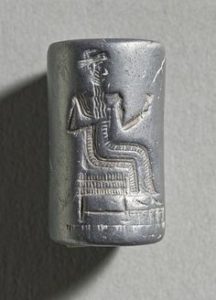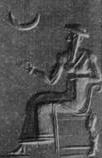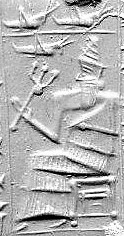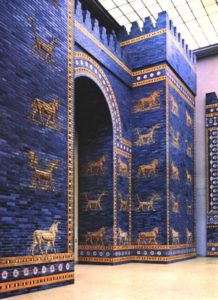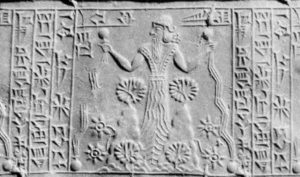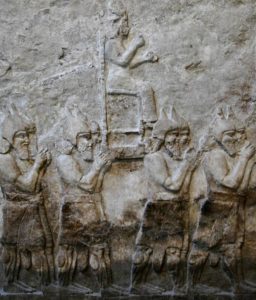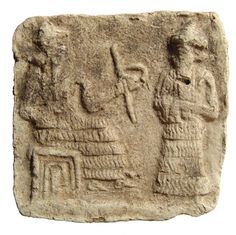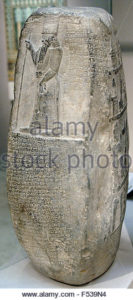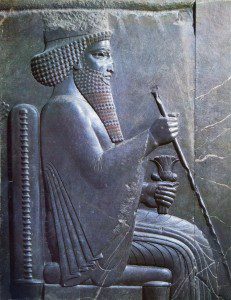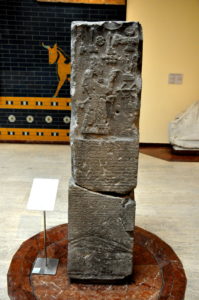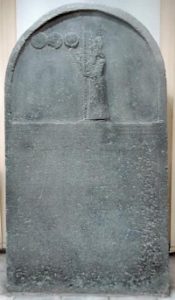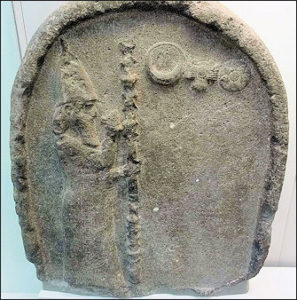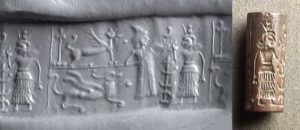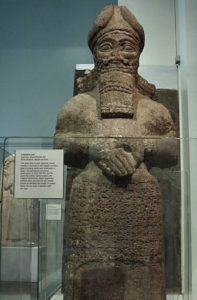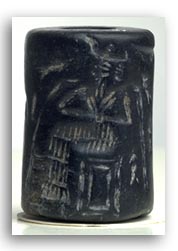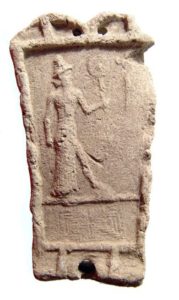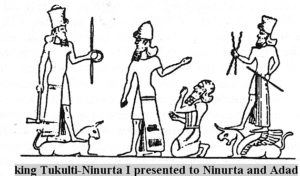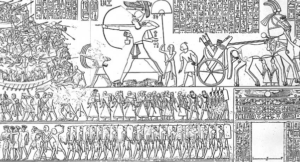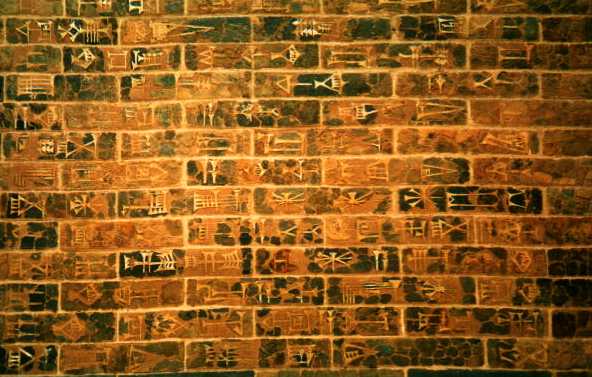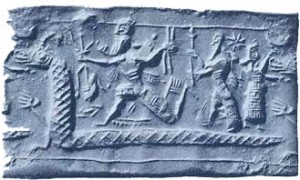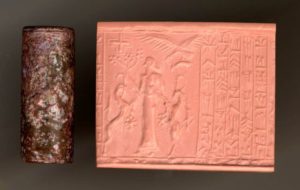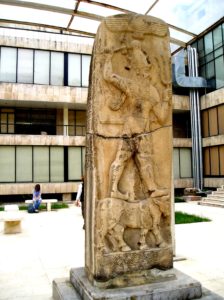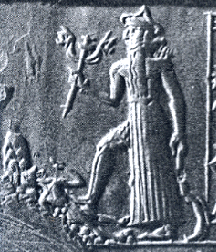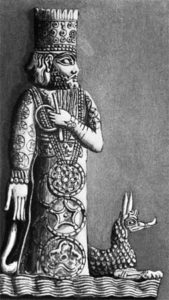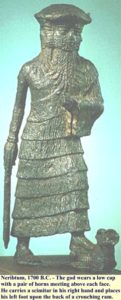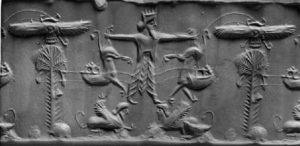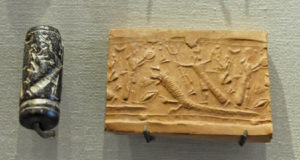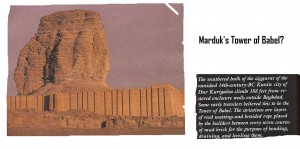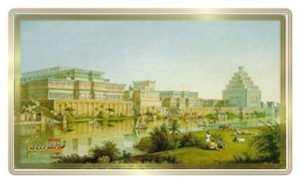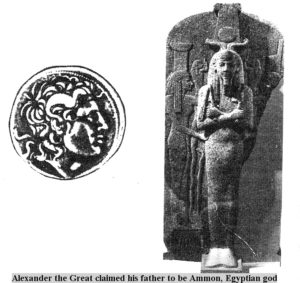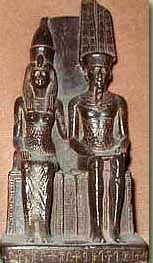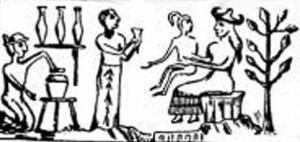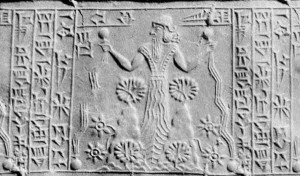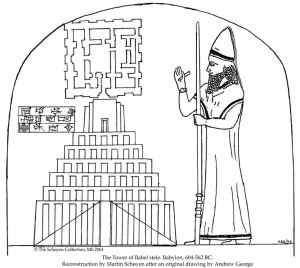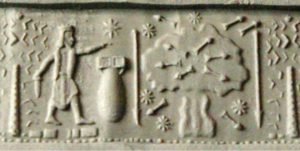The translation on this webpage was adapted from A.K. Grayson, Assyrian and Babylonian Chronicles (1975) and Jean-Jacques Glassner, Mesopotamian Chronicles (Atlanta, 2004).
(Texts: All Artifacts, Color Coding, & Writings in Bold Type With Italics Inside Parenthesis, are Added by Editor R. Brown, not the Authors, Translators, or Publishers!)
(gods in blue)
The Religious Chronicle (ABC 17) is a historiographical texts from ancient Babylonia. It deals with omens and events during the reign of several kings in the instable period between 1033 and 943: Nabû-šumu-libur, Simbar-šipak, Eulmaš-šakin-šumi, and Nabû-mukin-apli. The tablet was written in the Seleucid age.
The tablet, BM 35968 (Sp III, 504), on which the Religious Chronicle is inscribed measures 81 mm long and 99 mm wide. It is poorly preserved, the bottom and left-hand side being entirely broken away. There are several other smaller lacunae due to the flaking of the surface.
Translation of Column 1
|
1 […] |
|
2 […] Sin (Sin / Nannar) |
|
3 […] |
|
4 […] |
|
5 […] |
|
6 […] Bêlit-Nina […] |
|
7 […] they killed him/it |
|
8 […] Babylon […] |
|
9 […] Bêlit-[…] |
|
10 […] they went. |
|
11 […] Tigris |
|
12 […] |
|
13 […] to the Abul-mahiri (“Gate of the rate of exchange”) |
|
14 […] the temple of Ursag (Ninhursag’s house) which is in the district of Nippur. |
|
15 […] who saw him/it. |
|
16 […] Nabû-šumu-libur, the king,[1] |
|
17 […] a lion was lying lurking and they killed it. |
|
18 […] they went. |
|
19 […] was removed. |
|
20 […] he spoke |
|
21 […] Tašmetum (Nabu’s spouse) |
|
22 […] was seen. |
|
23 […] was seen. |
|
24 […] |
|
25 […] lower |
|
26 […] |
|
Lacuna |
Note 1:
Nabû-šumu-libur’s reign lasted from 1033 to1026. He was the last king of the Second Dynasty of Isin.
The Religious Chronicle (ABC 17) is a historiographical texts from ancient Babylonia. It deals with omens and events during the reign of several kings in the instable period between 1033 and 943: Nabû-šumu-libur, Simbar-šipak, Eulmaš-šakin-šumi, and Nabû-mukin-apli. The tablet was written in the Seleucid age.
Translation of Column 2
|
1 The king [1] arrived on the elevent day of the month Ajaru. |
|
2 He slaughtered but did not […] the lambs for the procession of Bêl (Marduk). |
|
3 The sacrifices and table prepared for the god which they had received up to the day of the Akitu festival |
|
4 they offered for four days in Esagila (Marduk’s ziggurat / residence in Babylon) and the other temples as in normal times. |
|
5 Until the day of the sacrifices the king did not make a libation nor did the šešgallû-priest make a libation but he did inspect the temple. |
|
6 In the month Du’ûzu a wolf was lurking in the west and he was killed. |
|
7 In the month Âbu physicians saw[8] a badger in the Uraš (Ninhursag) gate at the door of the šatammu‘s residence. |
|
9 On the twenty-fifth of the month Tašrîtu a live panther |
|
10 floated down the Euphrates and was killed[11] behind Egidrikalamasuma. |
|
11 It was carried on to dry land. |
|
12 On the sixteenth day of the month Abû, in the seventh year, two deer |
|
13 entered Babylon and were killed. |
|
14 On the twenty-sixth of the month Simanu, in the seventh year, day turned to night and there was a fire in the sky. |
|
15 In the month Ulûlu, in the eleventh year, water flowed within the wall of the lower forecourt. |
|
16 In the thirteenth year, the fourteenth year, and the fifteenth year, for three years in succession, |
|
17 the chariot of Bêl did not come out from the third day of the month Addaru until the month Nisannu. |
|
18 In the month Nisannu, in the fifteenth year, Bêl did not come out. |
|
19 On the fourteenth day of the month Ajaru, in the seventeenth year, the outer wall of the Uraš gate |
|
20 was seen to move. On the fifteenth day of the month Simanu, in the eighteenth year, |
|
21 when a wave[?] of water[23] came down from the Ištar (Inanna) gate to the Euphrates |
|
22 and entered Babylon in the west and |
|
23 two soldiers were killed. The cultic pedestal near the door of E[…] |
|
24 the panels of the door below the […]-gate […] |
|
25 and when it fell into the pit it was killed […] |
|
26 […] in the fourteenth year […] [2] |
|
27 […] the goddesses, troops […] |
|
28 […] they gave […] |
|
29 […] |
|
Lacuna |
Note 1:
It is likely that Simbar-šipak (1025-1008) is meant, the first king of the Second Dynasty of the Sealand.
Note 2:
We are now in the reign of another ruler, Eulmaš-šakin-šumi (1044-988), the first king of the Bazi dynasty.
Translation of Column 2
|
1 The king [1] arrived on the elevent day of the month Ajaru. |
|
2 He slaughtered but did not […] the lambs for the procession of Bêl. |
|
3 The sacrifices and table prepared for the god which they had received up to the day of the Akitu festival |
|
4 they offered for four days in Esagila (Marduk’s temple / residence in Babylon) and the other temples as in normal times. |
|
5 Until the day of the sacrifices the king did not make a libation nor did the šešgallû-priest make a libation but he did inspect the temple. |
|
6 In the month Du’ûzu a wolf was lurking in the west and he was killed. |
|
7 In the month Âbu physicians saw[8] a badger in the Uraš gate at the door of the šatammu‘s residence. |
|
9 On the twenty-fifth of the month Tašrîtu a live panther |
|
10 floated down the Euphrates and was killed[11] behind Egidrikalamasuma. |
|
11 It was carried on to dry land. |
|
12 On the sixteenth day of the month Abû, in the seventh year, two deer |
|
13 entered Babylon and were killed. |
|
14 On the twenty-sixth of the month Simanu, in the seventh year, day turned to night and there was a fire in the sky. |
|
15 In the month Ulûlu, in the eleventh year, water flowed within the wall of the lower forecourt. |
|
16 In the thirteenth year, the fourteenth year, and the fifteenth year, for three years in succession, |
|
17 the chariot of Bêl did not come out from the third day of the month Addaru until the month Nisannu. |
|
18 In the month Nisannu, in the fifteenth year, Bêl did not come out. |
|
19 On the fourteenth day of the month Ajaru, in the seventeenth year, the outer wall of the Uraš gate |
|
20 was seen to move. On the fifteenth day of the month Simanu, in the eighteenth year, |
|
21 when a wave[?] of water[23] came down from the Ištar (Inanna) gate to the Euphrates |
|
22 and entered Babylon in the west and |
|
23 two soldiers were killed. The cultic pedestal near the door of E[…] |
|
24 the panels of the door below the […]-gate […] |
|
25 and when it fell into the pit it was killed […] |
|
26 […] in the fourteenth year […] [2] |
|
27 […] the goddesses, troops […] |
|
28 […] they gave […] |
|
29 […] |
|
Lacuna |
Note 1:
It is likely that Simbar-šipak (1025-1008) is meant, the first king of the Second Dynasty of the Sealand.
Note 2:
We are now in the reign of another ruler, Eulmaš-šakin-šumi (1044-988), the first king of the Bazi dynasty.
Translation of Column 3
| Lacuna |
|
1 […] |
|
2 In the month Ajaru a wolf […] was lurting. He was seen and killed. |
|
3 In the month Ajaru a deer, which no one had seen enter the city |
|
4 was seen in Bab-bêliya[3] and killed. In the month Nisannu, in the seventh year, the Aramaeans were belligerent, |
|
5 so that the king could not come up to Babylon. Neither did Nabû (Marduk’s son) come |
|
6 nor Bêl come out. In the month Nisannu, in the eighth year of Nabû-mukin-apli, the king, |
|
7 the Aramaeans were belligerent, and Bab-nibiri (“Gate of the Crossing”) of Kar-bel-matati |
|
8 they captured. Thus the king could not cross, Nabû did not come, |
|
9 and Bêl did not come out. The king did not offer the sacrifices of the Akitu festival in Esagil. |
|
10 In the month Nisannu, in the nineteenth year of Nabû-mukin-apli, the king, ditto.[1] the sacrifices […] |
|
11 In the month Du’ûzu, in the sixteenth year, a lion which no one saw[12] enter the city |
|
12 in the western quarter on the eighth orchard |
|
13 was seen and killed. In the twentieth year of Nabû-mukin-apli, the king, |
|
14 Bêl did not come out nor did Nabû come. For nine years in succession |
|
15 Bêl did not come out nor did Nabû come. In the twenty-fourth (-fifth, -sixth?) year of Nabû-mukin-apli, the king, |
|
16 the genius, which stands in the right-hand side of the door of the shrine of […] |
|
17 was seen to move. A demon in the bed chambers |
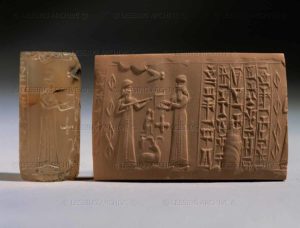 (Nabu & his father Marduk, Nabu is his 3rd son) (Nabu & his father Marduk, Nabu is his 3rd son)
18 of Nabû was seen. […] upon […] Nabû in the meat was seen. |
|
19 On the twenty-first day of the month Šabatu, in the twenty-sixth year of Nabû-mukin-apli, the king, Adad thundered, his fire […] |
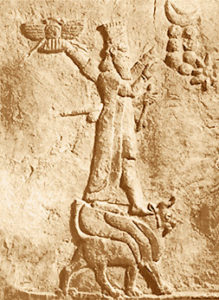 (Adad atop his Taurus symbol, alien winged sky-disc above)
(Adad atop his Taurus symbol, alien winged sky-disc above)
Translation of Column 4
Note 1:
I.e., “the king did not offer the sacrifices of the Akitu festival in Esagila (Marduk’s temple – residence in Babylon)“.
